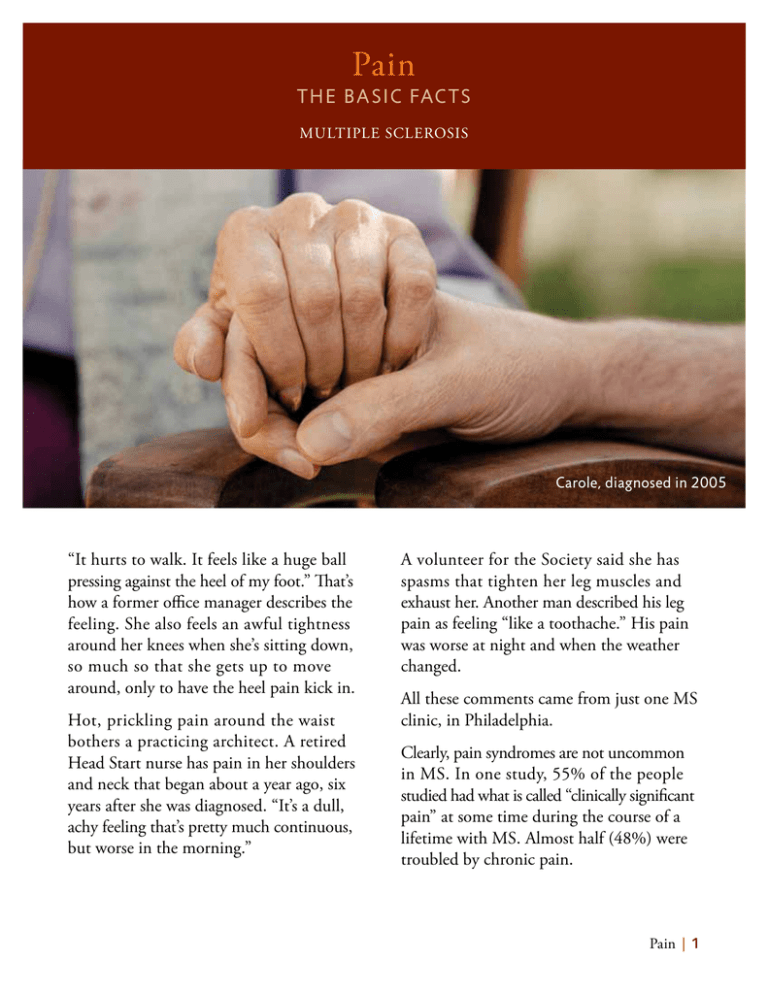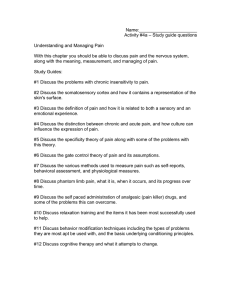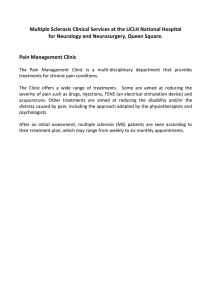The basic facTs - National Multiple Sclerosis Society
advertisement

Pain T he ba sic fac t s Multiple sclerosis Carole, diagnosed in 2005 “It hurts to walk. It feels like a huge ball pressing against the heel of my foot.” That’s how a former office manager describes the feeling. She also feels an awful tightness around her knees when she’s sitting down, so much so that she gets up to move around, only to have the heel pain kick in. Hot, prickling pain around the waist bothers a practicing architect. A retired Head Start nurse has pain in her shoulders and neck that began about a year ago, six years after she was diagnosed. “It’s a dull, achy feeling that’s pretty much continuous, but worse in the morning.” A volunteer for the Society said she has spasms that tighten her leg muscles and exhaust her. Another man described his leg pain as feeling “like a toothache.” His pain was worse at night and when the weather changed. All these comments came from just one MS clinic, in Philadelphia. Clearly, pain syndromes are not uncommon in MS. In one study, 55% of the people studied had what is called “clinically significant pain” at some time during the course of a lifetime with MS. Almost half (48%) were troubled by chronic pain. Pain | 1 This study suggested that factors such as age at onset, length of time with MS, or degree of disability played no part in distinguishing the people with pain from the people who were pain-free. The study did indicate that twice as many women as men had pain as part of their MS. serves no useful purpose. It robs sleep, saps energy, dampens mood, and curbs appetite. In some chronic pain conditions, the constant barrage of pain nerve signals sensitizes the central nervous system (the brain and spinal cord) so much that every pain is intensified and even a light touch can hurt. If you feel pain, it’s important to communicate that information to your physician. Describe the symptoms and their degree of severity as clearly as possible because treatments vary. And treatment is essential. Treatment can help prevent pain from taking over a person’s life. According to Dr. Stanley van den Noort, chair emeritus of the National MS Society’s Medical Advisory Board, it’s common for people with MS to have a relatively high pain threshold. Pain that occurs as a result of nervous system disease is different from the “good” pain that serves to protect the body from further injury. There are nerve endings sensitive to pain all over the body that sound an alarm to the brain when something is harming or about to harm it. The brain normally responds so quickly that a person has already withdrawn the fingers from the hot stovetop before realizing consciously what happened. This is functional pain at work, pre-venting severe injury. In more serious events, such as a sprained ankle or a broken bone, pain sounds a general alarm designed to make the individual rest and let the body heal. This, too, is functional pain, pain with a purpose. In contrast, “chronic” or recurrent pain — especially pain that occurs because of disease or injury of the nervous system — “Many are not unusually sensitive, until their pain becomes very severe. Then in spreads or refers into other areas,” he said. For example, he has seen patients who feel the prick of a pin in the foot as a severe pain in the shoulder. Pain in MS may be unusual in other ways. The central nervous system normally turns off many sensations from the body. As Dr. van den Noort explains, “I don’t feel the socks on my feet while I’m talking to you.” But this blocking mechanism may be affected by MS damage, allowing information to flood in, and pain to result. Often there is no simple association between the location and number of MS lesions (damaged areas in the brain or spinal cord) and the kind of pain the person is experiencing. But no matter how odd MS pain may be, it is real pain, and causes real suffering, which in turn can lead to depression. Steps should be taken to relieve it. Pain | 2 What to do First, it’s important for you and your primarycare doctor to distinguish between MS pain and other kinds of pain. Having MS doesn’t make you immune to headaches, cramps, arthritis, or low back pain. In arriving at a diagnosis, you and your doctor will need to consider the nature and source of your pain. According to Dr. Randall Schapiro, director of the Fairview MS Center in Minnesota, “The number one requirement for effective pain control is a proper diagnosis.” Several sources and types of pain in MS Acute Pain Trigeminal neuralgia is a stabbing pain in the face that can occur at any time during MS, even as an initial symptom. While it can be confused with dental pain, this pain is neurologic in origin. It can usually be treated successfully with medications such as gabapentin (Neurontin®) or carbamazepine (Tegretol®). In severe cases that do not respond to medication, a surgical procedure called rhizotomy can be performed. This procedure severs the nerve roots that carry sensation. “Lhermitte’s sign” is a stabbing, electricshock-like sensation running from the back of the head down the spine, brought on by flexing the neck. Medication is of little use because this pain comes so suddenly. A soft collar to limit neck flexion may be prescribed. Burning, Aching, or “Girdling” around the Body These sensations, called dysesthesias, are all neurologic in origin. These pains are sometimes treated with gabapentin (Neurontin®) or with antidepressants such as amitriptyline (Elavil®) because such agents modify how the central nervous system reacts to pain. Other treatments include wearing a pressure stocking or glove, which can convert the sensation of pain to one of pressure; and warm compresses to the skin, which may convert the sensation of pain to one of warmth. Chronic Pain Burning, aching, prickling, or “pins and needles” may be chronic rather than acute. The treatments are the same as for the acute dysesthesias described above. Pain of Spasticity This pain category has its own subcategories. Muscle spasms or cramps, called flexor spasms, may occur. Treatments include medications such as baclofen (Lioresal®), tizanidine (Zanaflex®), or other agents. Treatment also includes regular stretching exercises and balancing water intake with adequate sodium and potassium, as shortages in either of these minerals can cause muscle cramps. Pain | 3 Tightness and aching in the joints are other manifestations of spasticity, which generally respond well to the treatment described above. Chronic Back and Other Musculoskeletal Pain This can have many causes in MS. Pressure on the body caused by immobility, incorrect use of mobility aids, spasticity, stress on the body from the struggle to compensate for walking problems, may all contribute to musculoskeletal pain. An evaluation to pinpoint the problem is essential. Treatments may include heat, massage, ultrasound, physical therapy, and treatment for spasticity. Pain and the emotions Pain can be intensified by the fear that it is associated with a worsening of the disease. MS specialist, Dr. Jack Petajan of the University of Utah, said, “The severity of pain, and its location and extent, bear very little relationship to the extent or seriousness of the multiple sclerosis. To feel pain is a fearful experience, and it is common for people with multiple sclerosis to interpret their pain as a serious deterioration of their condition. In general, this is not the case.” Treatments for pain The chart on pages 7–8 lists typical pain problems and the approaches most often used to deal with them. But getting pain under control is not a cut and dried procedure. Complementary treatments Medication in combination with alternative therapies, such as biofeedback, hypnosis, yoga, meditation, or acupuncture improve relief for many. Even if pain responds reasonably well to medication, therapies such as massage, relaxation, humor, music, and distraction can improve pain control and quality of life. When pain keeps coming back A multidisciplinary pain clinic may be indicated for chronic disabling pain. In severe cases, some pain specialists prescribe opiates, such as methadone. The difficulty with narcotics is that people tend to become tolerant of their effects and need increasing doses. Pain | 4 Self help People who stay active and maintain positive attitudes often seem to be able to reduce the impact of their pain. They also experiment with home remedies. Indeed, it is characteristic of many people with MS to look for ways to help themselves and to take action to reduce their pain. The retired Head Start nurse finds using a loofa sponge and massaging with a soft ball of plastic netting helps relieve her shoulder and neck pain. The Society volunteer works out with a personal trainer to ease her painful leg spasticity and keep her muscles in shape. Another woman reported that she feels less pain after taking a nap, riding her stationary bicycle, swim-ming in cold water, or doing stretching exercises with her physical therapist. “When I’m doing something I like, the pain doesn’t go away, but I don’t think about it as much,” she added. Chapters of the National MS Society may be able to refer callers to area pain clinics or specialists and complementary therapy practitioners. See last page for additional resources. Research on pain MRI and newer imaging and microscopic technologies have been a boon to pain research, revealing the wide-spread distribution of pain pathways and pain centers within the brain. At the molecular level, pain researchers can now distinguish certain cells that transmit the normal “good” pain signals from the cells that are prominent in chronic pain. IMPROVING SELF REPORTS You have the right to have your pain treated. It is your responsibility to communicate where and how much pain you have to your health-care provider. Self report is the single most important piece of pain assessment. To improve your self reports, watch for pain triggers. Notice things that make your pain worse such as certain movements, fatigue, or worsening of other MS symptoms. Rate your pain on a scale of zero to 10 (with zero = no pain, and 10 = worst pain). As you rate the pain, note any activities, time of day, where you are, and who you are with. Describe the pain (sharp, achy, stinging, etc.) and what you did about it. It is wise to know what medications you are taking, and to learn the names and the side effects. Ask about the best time to take each one and what it is expected to do for you. Be an advocate in your own pain management. Always remember that pain is what the person experiencing the pain says it is. This will help you and your health-care provider treat your pain appropriately. Pain | 5 Investigators are tracking each step in the chemical chain that begins when a molecule makes contact with a receptor on a nerve cell membrane and ends with signals inside the cell directing specific genes in the cell’s nucleus to turn on or turn off. With each new pain molecule or gene discovery comes the potential for developing a drug that might selectively target that molecule and sup-press pain. The more selective the target, the less likely are undesirable side effects like constipation, nausea, or sedation. Newer pain-relieving drugs, such as the anticonvulsant gabapentin, are signs of the progress taking place. Other pain relievers now being tested include drugs that act on a class of nicotinic receptors (the receptor that reacts to tobacco) and a drug that selectively blocks a gate that opens when a pain nerve cell fires an impulse. Research on marijuana The largest clinical trial of marijuana derivatives for the treatment of MS symptoms was recently published in Lancet (2003, 362: 1517-26). These results showed that oral derivatives of marijuana do not provide objectively measured improvement in spasticity but they confirm prior suggestions that patients using marijuana felt better in ways that could not be measured by their physicians. It is essential to note that this study did not provide information related to the use of smoked marijuana. Smoking marijuana is medically unwise because the toxic effects appear to exceed those associated with tobacco smoking. Oral cannabis oil or synthetic THC pills appear to have benefits on pain. Whether the positive effects that patients reported resulted from a specific chemical effect of cannabinoids or a heightened “placebo” effect cannot be determined from this study because unpleasant side effects allowed the majority of participants to recognize that they were taking the active drug. Also, the study provided no quantitative information about the extent of the pain relief. The long-term effects of oral cannabinoids are not yet known and their use in most states remains illegal. The study data will be useful in the ongoing debate on the value of marijuana derivatives for MS. The fifth vital sign New facts about chronic pain and its consequences are sparking general changes in how physicians will practice medicine. The Department of Veterans Affairs has begun a major initiative asking VA physicians to record pain level as “the fifth vital sign” for every patient. An inquiry about pain will be added to the traditional four vital signs — temperature, blood pressure, and heart and respiration — taken during a standard physical exam. Acknowledging that pain should be documented and treated is a major step in changing the common belief that pain is “all in your Pain | 6 head” or the attitude that people who complain of pain are weak, depressed, want attention, or worse, just want drugs. This change in attitude comes at a time when the prospects for better pain treatments are also improving. Table 1 Types of Pain Characteristics Treatment Trigeminal Excruciating, sharp, shocklike • Carbamazepine, gabapentin, Neuralgia pain in cheek and forehead, lamotrigine, misoprostol, lasting seconds to minutes; phenytoin, baclofen (medications may be triggered by speaking may be combined) or a touch. •Surgery, as last resort: rhizotomy or nerve ablation (removal) Tonic Spasms Brief muscle twitching or sudden, sharp muscle spasm; may also burn or tingle. •Same medications as above Paroxysmal Painful burning, aching, or •Same as above and amitriptyline, Limb Pain itching of any part of the body clonazepam, diazepam but more common in the legs. •Application of heat and cold (some MS specialists avoid using heat) •Capsaicin ointment •Pressure stockings (some MS specialists recommend using pressure stockings and some do not) Headache Migraine, tension, or cluster •Treatment determined headache types. by type of headache Optic NeuritisIce-pick like eye pain. •Intravenous methylpred-nisolone, nonsteroidal anti-inflammatory drugs (NSAIDs) such as ibuprofen Dysesthetic Extremity Pain Chronic burning, tingling, •Same as for paroxysmal limb tightness, or pins-and-needles •Dull aching pain responds best to feelings; a dull warm aching; tricyclics such as amitriptyline worse at night and after exercise, •May require maximum dosing aggravated by temperature and weather. Pain | 7 Table 1 (continued) Types of Pain Characteristics Treatment Spasms Muscle cramping, pulling, •Stretching exercises and pain. •Baclofen, botulinum toxin, tizanidine, dantrolene, intrathecal baclofen Musculo- Caused by the physical stress •Stretching exercises Skeletal Pain of immobility. Physician should •Posture & gait evaluation; first rule out spinal disc disease. gait aids, orthotics •Exercise (esp. swimming) to increase strength and flexibility •NSAIDs such as ibuprofen •Proper seating, position changes, support and cushioning •Application of heat and cold Iatrogenic Pain Pain caused by MS treatment, •Discuss problems with your such as steroid-induced health-care provider; treatment osteoporosis, interferon side- may involve changing medication effects, injection site reactions. Secondary Pain of MS symptoms Pain associated with pressure •Treating the cause usually sores, stiff joints, muscle alleviates the pain. contractures, urinary retention, •Physician should assess for urinary tract infection, other depression. infections. Pain | 8 Additional information An MS specialty center (call your chapter for a referral.) American Chronic Pain Association (ACPA) P.O. Box 850 Rocklin, CA 95677-0850 Tel: 800-533-3231 Fax: 916-632-3208 E-mail: ACPA@pacbell.net Web site: www.theacpa.org Trigeminal Neuralgia Association National Office 925 NW 56th Terrace, Ste C Gainesville, FL 32605-6402 Tel: 352-331-7009/800-923-3608 Fax: 352-331-7078 Web site: www.tna-support.org Additional Pain Resources National Chronic Pain Outreach Association (NCPOA) P.O. Box 274, Millboro, VA 24460 Tel: 540-862-9437; Fax: 540-862-9485 E-mail: ncpoa@cfw.com Web site: www.chronicpain.org Mayday Fund (For Pain Research) c/o SPG, Christina Spellman, Executive Director 127 West 26th Street, Ste 800 New York, NY 10011 E-mail: mayday@maydayfund.org Web site: www.maydayfund.org American Pain Foundation 201 North Charles Street, Suite 710, Baltimore, MD 21201 Tel: 888-615-PAIN; (7246) E-mail: info@painfoundation.org Web site: www.painfoundation.org National Foundation for the Treatment of Pain P.O. Box 70045 Houston, TX 77270-0045 Tel: 713-862-9332; Fax: 713-862-9346 E-mail: jfshmd@gmail.com Web site: www.paincare.org Pain | 9 For further reading The Society publishes many other pamphlets and articles about various aspects of MS. Visit nationalMSsociety.org/brochures to download them, or call your chapter at 1-800-344-4867 to have copies mailed to you. *The National Multiple Sclerosis Society is proud to be a source of information about multiple sclerosis. Our comments are based on professional advice, published experience and expert opinion, but do not represent individual therapeutic recommendation or prescription. For specific information and advice, consult your personal physician. © 2003 National Multiple Sclerosis Society EG 0742 Lioresal is a registered trademark of Cibra Geigy Corp. Zanaflex is a registered trademark of Elan Pharmaceuticals Inc. Pain | 10

